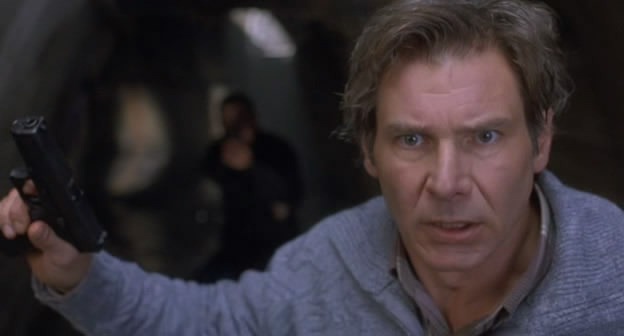

Director: Andrew Davis, 1993. (PG-13)
TV series have often been transported onto the silver screen, but very few have garnered Best Picture Oscar nominations. The Fugitive, based on the long-running TV series of the 1960s starring David Jensen, is one of these. Though it did not win this prize, it did earn Tommy Lee Jones his only Oscar for this role as a US Marshall.
The film opens with black and white flashback footage of a murder, shown as negative imagery. Interspersed is the color flashback to the preceding events where Chicago doctor, Richard Kimble (Harrison Ford), accompanies his wife Helen (Sela Ward) to a pharmaceutical charity event, filled with doctors from the hospital where he works. But the prologue makes it clear: Helen has been murdered and Richard is found guilty of her killing.
Transformed from surgeon to condemned murderer, it is while on the bus taking him and four other convicts to prison that he gets his break. The bus crashes, rolls down onto railroad tracks and then is hit violently by an oncoming train. Kimble barely manages to escape, racing away on foot with an abdominal wound. He has become the fugitive. But knowing his innocence, he is determined to investigate the murder on his own, even while evading the authorities, to find redemption.
 Called out to the scene, US Marshall Samuel Gerard (Tommy Lee Jones) and his team of deputies take over the case and initiate the state-wide manhunt for killer Kimble. The chase is on. With Gerard as determined to find Kimble as Kimble is to find the true killer (the one-armed man), these two are destined to intersect head-on in this gripping thriller.
Called out to the scene, US Marshall Samuel Gerard (Tommy Lee Jones) and his team of deputies take over the case and initiate the state-wide manhunt for killer Kimble. The chase is on. With Gerard as determined to find Kimble as Kimble is to find the true killer (the one-armed man), these two are destined to intersect head-on in this gripping thriller.Indeed, The Fugitive is one of the best thrillers of the last 20 years. Without being overly violent or filled with foul language, director Davis relies on excellent pacing, revealing information in bite-sized lumps to keep the viewer engaged, and terrific set pieces to carry the plot. And by keeping Kimble returning to the obvious places where the police are looking for him, Davis ratchets the suspense higher and higher.
A number of scenes stand out for their effectiveness. The crash sequence, shot in one take, sets the tone for the film. The action will be powerful and the pace will be fast. When the two key characters meet for the first time after a prolonged chase through the sewers, Kimble faces a tough choice and makes a swan dive that is unforgettable. Another suspenseful scene occurs when Kimble enters the figurative lion's den, going into city hall to talk to a one-armed criminal being held in jail there. He is the most wanted man in Chicago going into the most police-filled place in the city, where just one glance could lead to his capture. His exit leads to a cat and mouse hunt amid the St. Patrick's day parade chase. Each scene builds on the next until we need some reprise from the tension!
Through it all Kimble is a man on a mission. He is determined to succeed. He provides a powerful picture of the kind of perseverance we all need to carry into our lives. He has found a purpose; so must we. When we discover our purpose we should pursue it with this kind of determination, not letting anything stand in our way. In other words, we should live like Jesus, who set his face like flint (Isa. 50:7) and went to Jerusalem to the cross (Matt. 16:21) so we might live in him (Gal. 2:20).
Even while Kimble was trying to solve the mystery of the one-armed man, he still took time to save a life. Pursuing the investigation in a Chicago hospital, he sees a young boy on a gurney, and he reverts back to his doctor mentality; he takes action that will save a life while putting him in more danger.
Even while we are following our purpose, striving to accomplish our mission, we are still called to be mindful of those whose lives we intersect with. Such God-planned points of contact are often opportunities for our mission, means to move us to our ends. We cannot wear blinders, as horses do to keep them focused; we must utilize peripheral vision. We must be ready to minister as the spirit moves us (Acts 8:39), even if it slows us momentarily from our mission.
Finally Kimble placed himself on the path of pursuing truth as if his life depended on it. In fact it did. Our lives might not literally depend on the truth as his did, but the truth will set us free (Jn. 8:32) from the spiritual bondage that will lead us to spiritual death (Rom. 6:22-23). If we find the truth, as Kimble did, then we we face a crossroads: will we accept it and follow it, or will we ignore it and follow the lie. Jesus is the truth (Jn. 14:6). To follow the truth is to follow him. To do anything else, is to walk away from him, and deceive ourselves. Have you pursued and found the truth yet?
Copyright ©2011, Martin Baggs


No comments:
Post a Comment